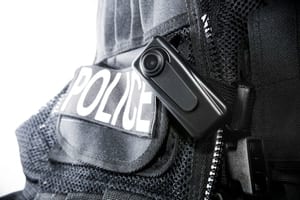
What to Know About Police Body Cameras in Florida
Police departments nationwide have incorporated body-worn cameras as part of their protocol. In 2016, the Bureau of Labor Statistics estimated that in 2016, around half of the country’s police departments required body cameras on their officer’s uniforms. Since then, more police departments nationwide have incorporated body-worn cameras as part of their protocol. Body cameras are mounted on an officer’s eyeglasses or chest area and offer real-time information about what goes on during an assignment. The technology has benefits for police departments, attorneys, and prosecutors. In Florida, police departments originally used body cameras to record DUI investigations. However, many departments now require body cameras for all field assignments.
How Do Body Cameras Work?
When police activate their body cameras, all events that occur between themselves and civilians are recorded. This protects both officers and civilians. Body cameras allow police officers and civilians to be held accountable for all actions that take place during a confrontation; neither party can lie about events that took place on video.
How Body Cameras Are Good For Police
Many police departments have been quick to make body cameras a required part of an officer’s uniform. Body cameras allow police departments to see the development of a situation from start to finish and assess all contributing factors to a confrontation. Additionally, body cameras encourage police departments to operate with full transparency.
How Criminal Defense Attorneys Can Benefit From Body Cameras
Criminal defense attorneys can use body camera footage to gauge whether an officer was abusing their power when they interacted with their client. When a police report doesn’t reflect what their client recounts from the event, body camera footage is a great resource to confirm or deny what took place. When the body camera video depicts the story told by the defendant, the video can prove their innocence in court.
Body cameras are also a great resource for criminal defense attorneys when the police lose evidence or video footage. In this case, an attorney is able to highlight to the jury that they would have been able to see what took place if not for the police’s inability to use their body camera correctly.
How Body Cameras Are Good for Prosecutors
While body cameras can be a great resource for criminal defense lawyers, they can also be utilized by the state against the defendant. For example, if body camera footage shows that the defendant had slurred speech or was combative during the situation, the state can essentially prove the defendant’s guilt.
How to Interact With Police Officers During a Confrontation
If you are arrested, pulled over, or confronted in any way by the police, it is important to know your rights and maintain a respectful demeanor. In Florida, if you are pulled over, you have the right to ask if a police officer’s body camera is on. If your confrontation leads to an arrest, you have the right to request a copy of the body camera footage from the police department. When interacting with police officers, it is important to always stay calm as any aggressive behavior can be used against you.
Contact a Skilled Criminal Defense Attorney
While body cameras hold a lot of value, they are still widely misused by police departments. As a U.S. citizen, you have a constitutional right to privacy. If you believe your privacy rights were violated during an interaction with a police officer, it’s essential that you contact an experienced criminal defense attorney in a timely manner. At The Umansky Law Firm, we are dedicated to representing clients whose rights have been violated by large adversaries.
Whether you need to be defended against the state, your insurance company, or law enforcement practices, we are here to offer our top-notch legal defense. Our team has more than 100 years of combined experience in criminal law. We work closely with our clients and communicate with them through every stage of the legal process. To schedule a free consultation, call our office or complete an online contact form for a free consultation.


